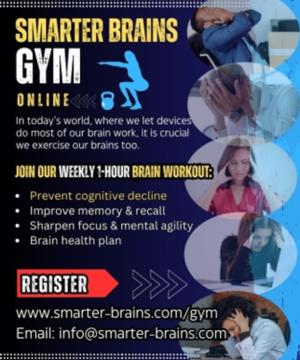The Comfort Epidemic: A Hidden Disruption of Human Intelligence by Artificial Intelligence
Dr. Segun Adu
- Organisation:
- Smarter Brains Ltd
- Regions:
- London, Dorset, Surrey, Oxfordshire, Buckinghamshire, Berkshire, Hampshire
- Notice Period:
- Emergency (maybe less than one week's notice)
- Type:
- Professional
- Fee:
- Free
- Category:
- Science
- Updated:
- 3rd February 2025
- Tagged:
- Ai | Emotional Intelligence | Artificial Intelligence | Human Intelligence
The widespread integration of Artificial Intelligence (AI) into various aspects of daily life has sparked concerns about its potential negative impact on Human Intelligence (HI), particularly concerning memory function. While AI technologies offer numerous benefits, including improved efficiency and accessibility, there are present and emerging concerns about their adverse effects on HI and human memory.
One significant concern is the phenomenon of cognitive offloading, where individuals increasingly rely on AI-powered devices and applications to store and retrieve information that was traditionally managed by the human brain. As people delegate memory-related tasks to AI algorithms, such as remembering phone numbers, addresses, or schedules, there’s a risk of cognitive decline due to reduced mental stimulation and reliance on external aids. Over time, this may lead to a deterioration in memory recall ability and overall cognitive function.
Moreover, the constant availability of AI-driven digital assistants and smart devices can lead to a phenomenon known as digital amnesia, where individuals become reliant on external devices for storing information, resulting in a decline in their ability to retain and recall information independently. Continuous reliance on AI for memory-related tasks may weaken neural pathways associated with memory encoding and retrieval, ultimately leading to decreased memory performance and cognitive flexibility.
Our experience of what it is to be human will continue to change as the exponential growth of what is already an immense number of use cases of generative AI will have a profound impact on everything ‘we do’ – or ‘stop doing’ as humans. Increasingly we are going to find that AI intervention in all areas of white-collar work and creativity will become ubiquitous – predictably at the expense of our mental agility. While AI technologies offer unprecedented opportunities for innovation and convenience, it’s crucial to acknowledge and address their potential negative impact on memory function and overall HI.
To mitigate these risks, it’s essential to promote continuing mental agility using strategies and approaches that exert the brain daily in ways that enhance memory function and stave off cognitive decline in the AI age.
https://pmi.org.uk/event-listing/pmi-uk-london-branch-event-the-comfort-epidemic-a-hidden-disruption-of-human-intelligence-by-artificial-intelligence-19th-february-2025/
Views: 604 | Enquiries: 2About Dr. Segun Adu
Preventing Alzheimer's Dementia in the Modern World
Dr. Segun Adu is a leading cognitive fitness expert and the founder of Smarter CEO and Smarter Brains GYM. He is dedicated to helping individuals protect and enhance their cognitive health - with a sharp focus on preventing Alzheimer’s and dementia. He holds a DBA from Henley Business School, where his doctoral research explored Emotional Intelligence, Cognitive Psychology, Neuroscience, and Behavioural Science in the context of leadership performance.
A passionate advocate for mental and cognitive resilience in the age of AI, Dr. Adu delivers regular masterclasses at institutions such as the London Chamber of Commerce and the University of London. His work empowers CEOs, leaders, and professionals to unlock their full mental potential through evidence-based techniques in memory retention, emotional intelligence, and cognitive agility.
As founder of the Smarter Brains GYM, Dr. Adu is pioneering a proactive response to the global rise of digital dementia - providing cutting-edge neuroplasticity training designed to strengthen brain performance, adaptability, and long-term resilience.
Key Focus Area:
In today’s hyper-digital world, the human brain is facing an unexpected crisis: digital dementia — a condition where over-reliance on technology leads to cognitive decline, particularly affecting memory, attention span, and critical thinking.
This phenomenon, once thought to affect only the elderly, is now increasingly seen in younger adults due to the pervasive use of smartphones, GPS, and on-demand information systems that replace active memory use.
Addressing cognitive decline requires a multifaceted approach that balances the benefits of AI with the need to maintain cognitive resilience. Studies show that just like muscles, the brain requires regular and varied exercise to maintain neuroplasticity - the ability to form new neural connections and adapt over time. Through weekly workshops and daily exercises, you’ll challenge your mind, move your body, and rewire your habits for a healthier, more resilient brain.
Smarter Brains GYM is an 8-week cognitive fitness and health programme (like Cognitive cross-training), that combines. It’s been designed for individuals aged 35+, or simply anyone who wants to stay mentally agile, reduce the risk of cognitive decline, and thrive in an AI-driven world. At the core of this program is the SUSTAIN Framework. A daily framework to stimulate brain performance, preserve mental agility, and stave off cognitive decline using science-backed approaches.
During the session, we will explore:
- Cognitive decline in the age of AI
- Parts of the brain being affected
- Preventing Cognitive decline 4, Introduction to brain fitness
- Q&A
Dr. Segun Adu Cognitive Scientist www.smarter-brains.com
Send a message to the speaker
If you are interested in this talk and wish to contact the speaker, please complete the following form:


